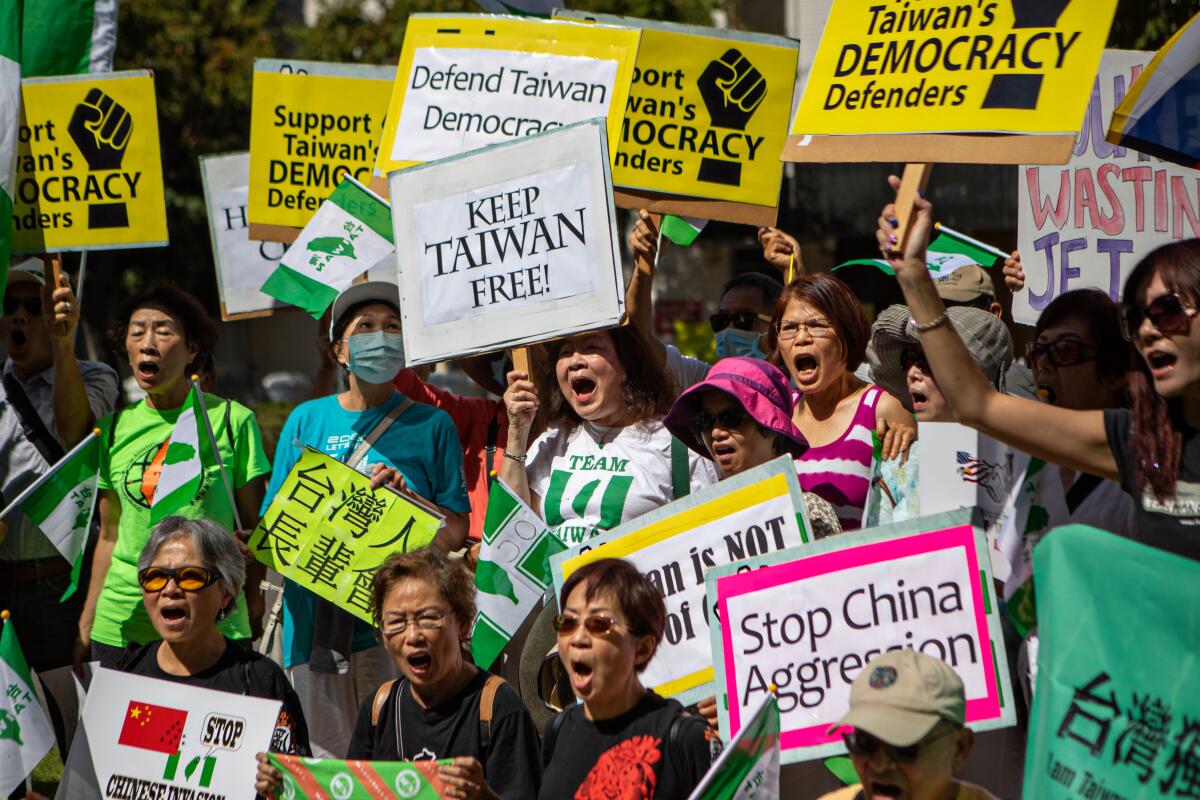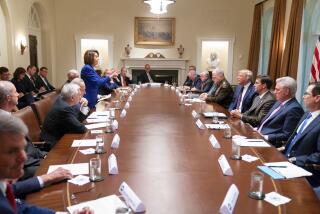Column: Taiwan is a place in the world, and I feel very strongly about that

- Share via
Yes, I am Taiwanese American, but I regret to inform you that I will not be taking a side on whether House Speaker Nancy Pelosi was right to visit Taiwan last week.
My entire extended family lives there, and I have many better-informed relatives to answer to. Relatives who, when I proudly display the Mandarin I have polished as a reporter in the San Gabriel Valley, pat me on the head like I’m a particularly intelligent talking dog. Relatives who take me to all the delicious places to eat, who might stop if they didn’t like my thoughts on cross-strait politics.
So the strongest opinion I can offer about this week of debates over Taiwan is this: Please, don’t mess this up for me.
Taiwan is a beautiful island that I have been visiting nearly every year since I was a child.
Politics has always been a sensitive subject, and the divide is generational. All my cousins believe in Taiwanese identity and independence, and my aunts and uncles usually vote for the Kuomintang party, which has favored closer relations with China.
My last visit to Taiwan took place shortly after Tsai Ing-wen was elected president. And disgruntlement over the results dominated the conversation during our Lunar New Year dinner.
A debate broke out among the adults over why Tsai, who has quietly acted to secure Taiwan’s sovereignty, won. A younger relative was called down to explain his vote. After a few halfhearted protests, he read the room and beat a hasty retreat up the stairs.
My strategy during these debates is similar. I pretend I do not hear anything, sit there and eat my food.
So I found it strange to see so many of us leap into the debate over Pelosi’s visit and the question of Taiwan’s sovereignty.
Should I thank Pelosi’s critics, who seem to have developed a deep concern for Taiwan’s sovereignty overnight?
Or should I be grateful to Pelosi (D-San Francisco), who took the trip without coordinating with the Biden administration?
And I’m sure everyone participating in this debate has first familiarized themselves with the long history of political conflicts in the Taiwan Strait.
Some commentators are already calling this the fourth Taiwan Strait crisis. The first Taiwan Strait crisis, in the 1950s, is what brought my family to America.
Though that’s not the story I was told growing up. Like most immigrant parents, my dad told me that he came to America so that his children could have a better life.
But the real story is that my grandfather instructed my father to go to America and start a new life for the family as a hedge against the possibility of war.
Conflict seemed inevitable, and my family was concerned that they would have to flee from war.
These are the messy parts we leave out of the simplistic narratives we use to explain immigration. The truth is that immigrants are not simply lured here by their admiration for America — they are running from danger and instability that more often than not, the U.S. has played a hand in.
Covert illegal American intelligence operations destabilized governments across Central and South America, and those actions are the ultimate cause of the immigration crisis at the border. Wars of imperialism in Vietnam and Korea destroyed homes and created hundreds of thousands of refugees. Immigrants to America, whether we call them refugees or not, are fleeing from existential threats.
So I am too cynical to believe that this latest clash between superpowers is about democracy or culture.
Pelosi stands to gain politically by supporting Taiwan in such a public way, but the photo opportunities with the Taiwanese president might have a steep price. Signaling support isn’t the same thing as promising to come to Taiwan’s aid in the event of Chinese military action.
Xi Jinping, China’s leader, needs support to seek an unprecedented third term as chairman of the Chinese Communist Party, and he needs to take a strong stance on Taiwan to achieve that.
Taiwan is the world’s most important producer of microchips, and its location just off the coast of China is an invaluable strategic asset for both the U.S. and China. The island of 23 million people is the rope in a giant game of tug of war that stretches across the South China Sea.
When we can see Taiwan only in terms of its political and strategic value, Taiwan’s people lose.
Taiwan Strait crises, when you boil them down, are essentially a series of overheated discourses leading to overheated political actions, with the dangerous consequences of real conflict.
Behind this compelling global drama of countries and ideologies clashing are families like mine trying to survive. Eldest sons who cannot be at their father’s deathbed. Daughters who never get to take care of their aging mothers. Immigrants who are forever outsiders in their new home and can no longer recognize their home country.
So here’s what I’m asking. In a world where instant, absolute certainty has become such a marketable commodity, dare to be uncertain.
Because with uncertainty comes the willingness to learn. And that is the only way these issues advance.
So prevaricate, please, just for a bit. Vacillate, equivocate, whatever you need to do. Maybe waffle a little.
Because I don’t know who is helped by this rush to judgment. It’s certainly not the Taiwanese people.
More to Read
Sign up for Essential California
The most important California stories and recommendations in your inbox every morning.
You may occasionally receive promotional content from the Los Angeles Times.











